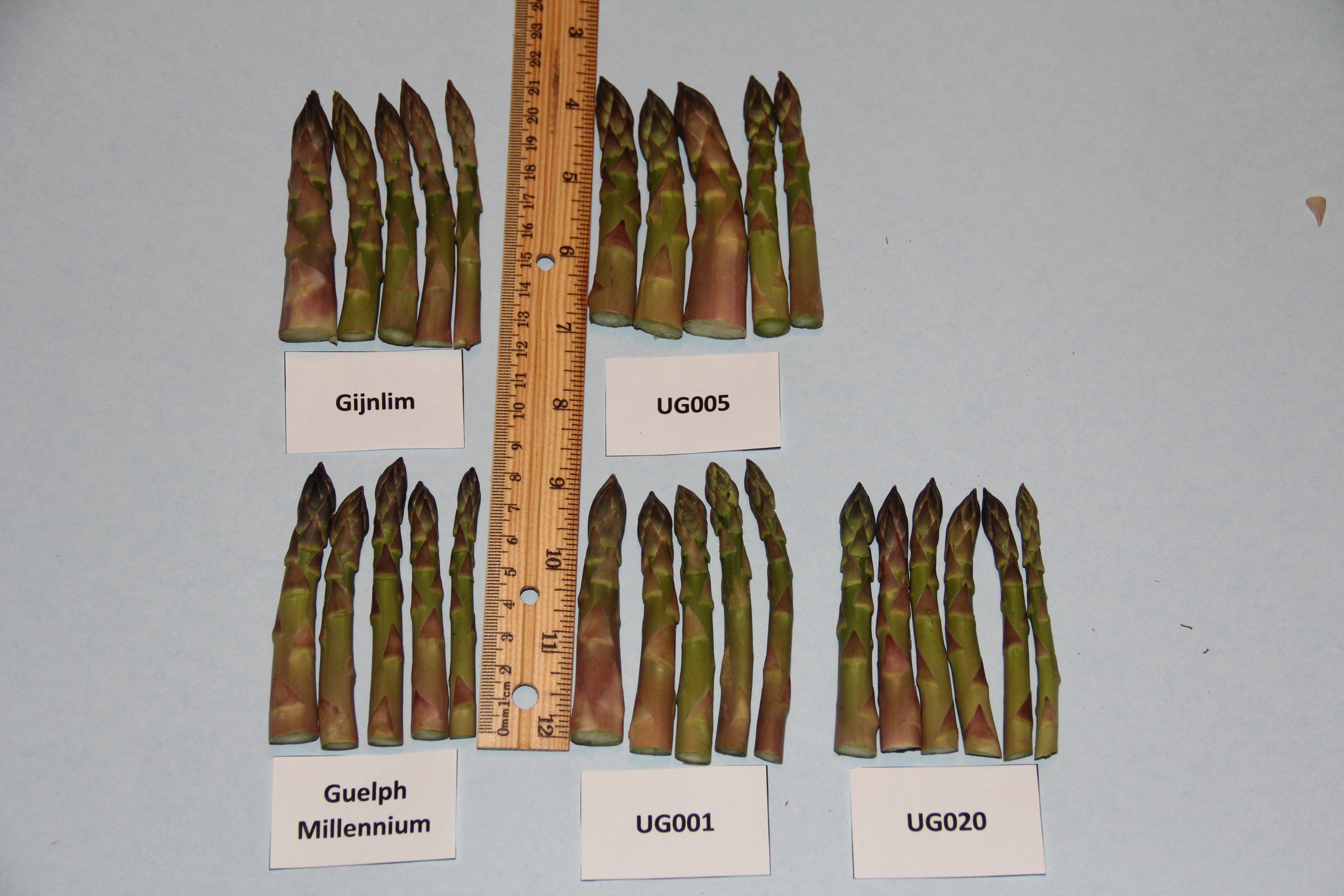Guelph Evolution
| Denomination: | 'Guelph Evolution' |
|---|---|
| Previously Proposed Denomination: | 'UG001' |
| Botanical Name: | Asparagus officinalis |
| Applicant/Holder: |
University of Guelph Research Innovation Office Building #92, 50 Stone Road East Guelph, Ontario N1G 2W1 Canada |
| Breeder: |
David Wolyn, University of Guelph, Guelph, Ontario |
| Application Date: | 2014-02-03 |
| Application Number: | 14-8189 |
| Grant of Rights Date: | 2017-12-07 |
| Certificate Number: | 5591 |
| Date rights surrendered: | 2018-12-07 |
Variety Description
Varieties used for comparison: 'Guelph Millennium' and 'Gijnlim'
Summary: 'Guelph Evolution' has a low to medium frequency of plants with one or more androhermaphrodite flowers whereas 'Guelph Millennium' and 'Gijnlim' have a high to very high frequency of plants with one or more androhermaphrodite flowers. The first bracts at the base of the apex of the spear of 'Guelph Evolution' are larger than the first bracts at the base of the apex of the spear of 'Guelph Millennium'. 'Guelph Evolution' has medium dense phylloclades whereas 'Gijnlim' has dense phylloclades. When fully extended, the length of the stem of 'Guelph Evolution' is shorter than the stem of 'Guelph Millennium'.
Description:
PLANT: medium density of phylloclades, medium intensity of green foliage, many stems, androhermaphrodite flowers and/or male flowers with style rudiments are present, plants with androhermaphrodite flowers occur at a low to medium frequency
SPEAR: early emergence
SPEAR APEX: medium triangular shape, anthocyanin colouration present, equal in diameter compared to middle of stem
BRACTS: adpressed, closed to weakly open
FLOWERING: begins early in the season
Origin & Breeding History: The male asparagus hybrid 'Guelph Evolution' (experimental number UG001) is produced by crossing a female clone and a supermale clone. The initial cross was made at the University of Guelph, Guelph, Ontario in 1995. The female parent was a plant selected from an open-pollinated asparagus variety. The supermale parent was a plant grown from seed extracted in 1994 from andromonoecious berries found on a male asparagus hybrid. Selection criteria for 'Guelph Evolution' included high marketable yield, resistance to foliar diseases and longevity of years of harvest. The hybrid was also selected for long, smooth spears with tight tips and uniform spear diameter.
Tests & Trials: The comparative trials for 'Guelph Evolution' were conducted at the Simcoe Research Station, Simcoe, Ontario in 2015 and 2016. There were two replicated plots for each of 'Guelph Evolution', 'Guelph Millennium', and 'Gijnlim'. Each plot contained twenty crowns spaced 30 cm apart with a distance between rows of 1.25 metres. Mean differences are significant at the 5% probability level based on a paired Student's t-test.
Comparison tables for 'Guelph Evolution' with reference varieties 'Guelph Millennium' and 'Gijnlim'
Length of first bracts at base of apex of spear (cm)
| 'Guelph Evolution' | 'Guelph Millennium' | 'Gijnlim' | |
|---|---|---|---|
| mean 2015 | 0.9 | 0.8 | 0.9 |
| std. deviation | 0.19 | 0.19 | 0.18 |
| number measured | 38 | 39 | 37 |
| mean 2016 | 1.2 | 1.1 | 1.3 |
| std. deviation | 0.20 | 0.13 | 0.18 |
| number measured | 38 | 40 | 38 |
Width of first bracts at base of apex of spear (cm)
| 'Guelph Evolution' | 'Guelph Millennium' | 'Gijnlim' | |
|---|---|---|---|
| mean 2015 | 0.6 | 0.5 | 0.5 |
| std. deviation | 0.16 | 0.15 | 0.14 |
| number measured | 38 | 39 | 37 |
| mean 2016 | 1.1 | 1.0 | 1.2 |
| std. deviation | 0.19 | 0.19 | 0.36 |
| number measured | 38 | 40 | 38 |
Maximum length of fully extended stem (cm)
| 'Guelph Evolution' | 'Guelph Millennium' | 'Gijnlim' | |
|---|---|---|---|
| mean 2015 | 140.5 | 146.9 | 141.8 |
| std. deviation | 16.01 | 19.51 | 24.42 |
| number measured | 38 | 40 | 38 |
| mean 2016 | 182.2 | 195.5 | 190.9 |
| std. deviation | 15.07 | 17.60 | 28.00 |
| number measured | 38 | 40 | 38 |
Click on image for larger view

Asparagus: 'Guelph Evolution' (centre bottom) with reference varieties 'Guelph Millennium' (bottom left) and 'Gijnlim' (top left)
- Date modified: